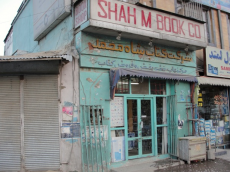
Asne Seierstad’s The Bookseller of Kabul, after its release in Norway in 2002, went on to become one of the bestselling Norwegian books of all time and has attracted both high praise and heavy criticism for its portrayal of the Khan family (as they are named in the book), whom Seierstad spent three months with after having reported on the defeat of the Taliban in late 2001, some of which is less than complimentary.
She makes clear in her foreword to the book that, quote, “this book is written in literary form, but it is based on real events or what was told to me by people who took part in those events” (3). It would have been interesting to hear why Seierstad made the decision to write a non-fiction account in the form of a piece of fiction, but when reading it as a novel at least it arguably gives the various stories of the characters an added sense of authenticity, especially when their actions are shown to have been informed by the historical-political situation in Afghanistan at the time, such as when Sultan’s family return to the country having left it in 1992 to live in Pakistan in the wake of the civil war between the Mujahedeen and the incumbent Communist regime (23). Nevertheless, I think the form and content of the book does raise interesting and perhaps difficult questions as to how we are to read the book, and, in particular, whether we should read it more as a piece of journalism or as a piece of storytelling. (Is it perhaps more valid, or of more cultural value, as one or the other?)
Seierstad portrays Sultan Khan, the Bookseller of Kabul himself, as a paradoxical character, relatively liberal in his political outlook, whilst at the same time being an authoritarian patriarch in his domestic life. He has an iron grip over his household and though others in the house, his mother, his first wife and his sisters are allowed to protest, he always has the final word and though he was made to go to school by his mother when he was a child he forbids his sons from going to school so they can work in his book shops.
Yet we are also told that, “he was a freethinker and of the opinion that everyone had the right to be heard” and “that he was obliged to procure whatever anyone wanted” in contrast to the Taliban who “regarded debate as heresy and doubt as sin” (17, 21). As a result of his pluralism he is arrested by the so-called “Ministry of Morality” whose job it is to shut down dissenting views, and could be said to bear a resemblance to the Ministry of Truth in Nineteen Eighty-Four (18). Added to this, he is said to be a “moderate Muslim”, who ignores four of the five calls to prayer each day, who “reluctantly” respects the fasting during Ramadan and despises the Taliban, whom he looks down on as “illiterate peasant priests” (18).
Image: By Michal Hvorecky from Slovak Republic (Shah M Bookstore in Kabul) [CC BY 2.0 (http://creativecommons.org/licenses/by/2.0)], via Wikimedia Commons

0 Comment:
Be the first one to comment on this article.